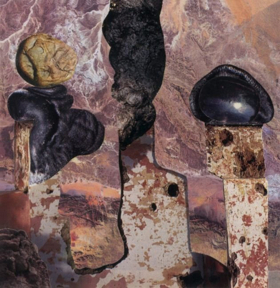Liam Singer Premieres Video for TEST TONE via PopMatters

PopMatters has just premiered chamber pop experimentalist Liam Singer's video for "Test Tone," the synth-driven new single off Singer's fifth full-length album Finish Him, out 7/13 on Birdwatcher. Watch the video here. "I like over-the-top expressions of emotion," says Singer. "Scott Solter [the album's producer [who has worked with the Mountain Goats, Erik Friedlander] likes to invoke Edward Gorey and the Brothers Quay when we're recording. There's a sense of playfulness and high drama at the same time."
Fittingly, the "Test Tone" video, a campy journey into '80s VHS b-movie sci fi visuals underscored by experimental dance and a serious message about miscommunication and disconnection. PopMatters praised the song as "a haunting and haunted examination of miscommunication and disconnect within relationships.""I wrote Test Tone," Singer expains, "when I fully embraced the concept of returning to an earlier love of synthesizers and electronic tone-colors in my songwriting. Test Tone isn't a dance track, but in my creative process it was a step in the direction of writing songs out of a more physical place. I'll always be an overly-heady person, but getting to a greater balance between mind and body was important to me both musically and personally. The lyrics are about the way someone's memory can linger after they're gone, and it connects that phenomenon to a larger sense of nostalgia by filtering the memories through the sounds and images created by analog technology. I've always had highly dramatic instincts in my songwriting while being simultaneously afraid of going 'over the top,' but here I decided to abandon those fears."https://liamsinger.bandcamp.com/album/finish-him-2
https://birdwatcherrecords.com/product/finishhim/Aside from his solo work, Liam has recorded or performed with Slow Six, Sontag Shogun, The Balustrade Ensemble, and Alexander Turnquist. A longtime NYC resident, Liam now lives in Catskill, NY and operates the venue/gallery HiLo.Tiny Mix Tapes declared his previous album Arc Iris "one of the best crafted records anyone, anywhere will release this year."
The 405 called previous single "The Devil" "a song of dramatic and harsh revelations" that "opens spectacularly with thunduering drums creating echoes upon echoes" and noted Singer's affinity for using the devil as a metaphor for loneliness and isolation. Leadoff single "I Want to See Sparks" is currently up on Spotify, and I'd love to connect with you on coverage.
Singer is a Portland, OR native who spent most of his youth in one of four places: 1) taking music lessons on piano and harpsichord 2) hunching over his beloved 4-track in his bedroom 3) working at a local junk store, where he spent most of his money accumulating old beaten-up synths 4) attending high school on the wealthy side of town, where he wasn't exactly a loner but didn't fit in much either. His music has always straddled the line between formal classical knowledge and blind, self-taught fumbling on unfamiliar instruments like the accordion and theremin. With Finish Him, Singer revives his love of synthesizers and '80s pop for a more direct-to-the-hips approach than his previous material, but with a Baroque twist and a flair for melodrama. On his previous two albums, 2013's Arc Iris and 2010's Dislocatia, it was easy to picture Singer's past experience as a composition student getting lost in Steve Reich's seminal Music for 18 Musicians at his college library. And though both of those earlier titles demonstrate Singer's innate knack for making the cellular repetition of minimalist composers like Reich less angular and more palatable, he didn't deviate much from the highbrow demeanor typical of chamber pop.With Finish Him, however, Singer throws himself a coming-out party and wears his abiding love for '80s pop on his sleeve. Of course, we're talking about some of the most ambitious, grandiose pop from a time when traces of the Baroque and avant-garde began to seep into the margins of the mainstream alongside the iconic synths, gated reverbs and big hair.By that time, he had already found a bridge between synthesizers and minimalism via the work of Tangerine Dream, Wendy Carlos, and Isao Tomita. "Every album I've released in my adult life," Singer explains, "has that dichotomy of the high school kid messing around on a 4-track and the college kid who was getting super into modern classical and notation and all that, and finding my own balance between the two.""That balance," says Singer, "is definitely shifting," especially as he draws more and more from electronic and dance elements --- all wrapped up in Singer's intentionally melodramatic delivery that lands somewhere between poignant and frivolous."I like over-the-top expressions of emotions," he chuckles. "I'm drawn to the idea that intimate, whispered, Elliott Smith-styled vocals could impart the same drama that an operatic style can, even though they're on the opposite ends of the performative spectrum.."
Comments

Videos

